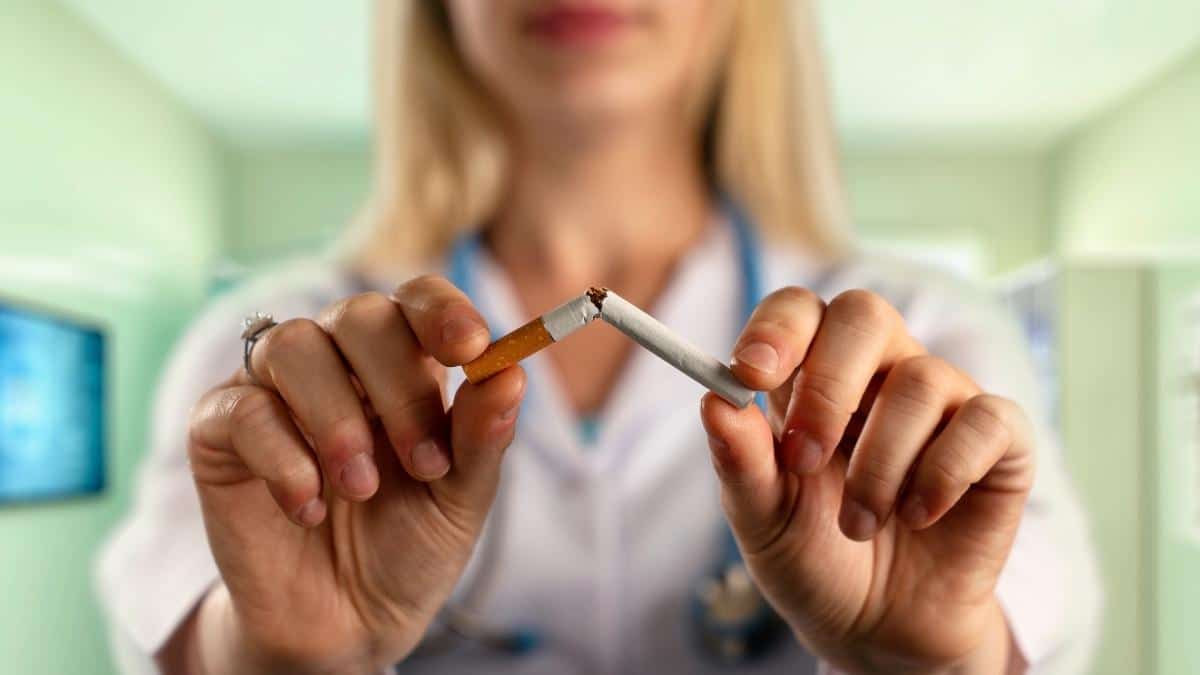Ashley just got home from a stressful day at work. After dealing with late reports and putting out sudden fires, she wants nothing more than to unwind from the craziness of the day.
She walks to her apartment window and opens it. Lighting up a cigarette, she lets the putrefying smoke billow into the winds grasp, and then suddenly she stops.
Ashley knows full well that she needs to quit. But how does someone quit smoking? What are the effects from smoking-related diseases?
You Can Quit Smoking!
The hardest part of quitting is finding the motivation to take the first step. There’s always a reason to put it off, and there’s one universal truth about quitting that applies to each and every one of us: No one is ever prepared to quit smoking.
Even if we admit to hating the habit, to having wanted to quit for years or decades, or that we’ve dreamt of living nicotine-free forever, the desire to quit is not the same as feeling ready to quit. The excuses not to quit come so easily.
- I’ll quit next week, when the stress of ________ has passed.
- I don’t want to waste this last pack of smokes. I’ll just use them up. Yeah, I’ll celebrate quitting by finishing these last few cigarettes!
- What, quit before (insert major fun event here)? No way–I’ll be miserable at the whatever if I’m in the middle of nicotine withdrawal.
- Yada, yada, yada. (Insert your own fourth reason here.)
But seriously–don’t beat yourself up. We all do it, but it’s not weakness.
It’s addiction.
And in the case of addiction, we need to admit that getting help is a good idea. Now, let’s compare the reasons not to quit with the reasons for quitting.
Reasons To Quit
In case there is still a need to remind someone why quitting is a good idea, and in case there is one smoker out there who can’t think of a single reason to quit, here are four:
Your Health
You’re not Ironman, and you’re not Wonder Woman. Your health is something that can be destroyed by a vice you may love. The American Lung Association has a Q&A page sums it up pretty well in a paragraph. Here it is:
Q: What are the health benefits of quitting smoking?
A: Soon after you quit smoking, you will notice you have more energy and less stress. Your smoker’s cough will go away, although for some it may take weeks as your lungs clean themselves by bringing up mucus. Your eyes and throat won’t be irritated, and your senses of taste and smell will improve. Your risk of heart attack and stroke drop quickly. Over time, you’ll have fewer colds and respiratory infections, and your body will repair some of the damage caused by smoking. In the long run, you reduce your risk of lung cancer as well as chronic obstructive pulmonary disease (COPD), which includes chronic bronchitis and emphysema, and is the third-leading cause of death in the U.S. You will also have fewer wrinkles, whiter teeth and will no longer smell like tobacco. You’ll even save money – lots of it!
Your Loved Ones’ Health
One of the biggest health hazards associated with smoking is secondhand smoke. There is no amount of secondhand smoke that’s safe.
Secondhand smoke causes coronary heart disease, stroke and lung cancer. Secondhand smoke can cause severe asthma attacks in children, as well as respiratory infections, ear infections and sudden infant death syndrome.
Expense
The average pack of cigarettes in the U.S. costs over six dollars. Do you smoke? How much are you spending per month? And don’t think that’s all you’re spending.
According to the American Cancer Society, tobacco-related health care and productivity loss costs in the U.S. amount to about $290,000,000,000 per year. That’s a lot of zeros, my friend.
Think of what you could spend your smoking budget on instead of chemical-laced tobacco products. Think of what our nation could do with another $290 billion bucks.
Inconvenience
Where can a smoker light up in public these days? (Hint: nowhere) Excusing oneself from a social gathering to stand in the rain and smoke can be a pain. It can be inconvenient as well as socially awkward.
You Can Quit Smoking. Here’s 2 Helpful Options.
Quitting smoking is the single most important thing smokers can do to improve the quality of their lives, not to mention the length. Quitting is tough, but no one has to do it alone. Here are a few of the many options to help people quit:
1. Freedom From Smoking
For adult smokers, the American Lung Association offers the Freedom From Smoking® program which teaches skills and techniques proven to help smokers quit. Freedom From Smoking® is available as a group clinic, an online program or as a book. The ALA also has cessation counselors available on their Lung HelpLine.
2. Quitter’s Circle
With a strong online community of “Quitters” and mobile app, Quitter’s Circle can be an effective smoking cessation alternative. Developed in collaboration between the American Lung Association and Pfizer, Quitter’s Circle helps users personalize a quit plan and access healthcare provider resources for quitting.
Tips To Quit Smoking
At one time or another, chances are you’ve probably said to yourself; “I can quit whenever I want.” Thinking that you have direct control over your smoking is a common misconception by many smokers.
Tobacco use can lead to an addiction and serious health problems. But if you quit smoking, this stoppage can greatly reduce the risk of developing smoking-related diseases.
If you are trying to quit, there is good news. Smokers can and do quit smoking every day! In fact, today there are more former than current smokers.
Smoking tobacco is both a physical addiction and a psychological habit. The nicotine from cigarettes provides a temporary and addictive high. Eliminating that regular fix of nicotine will cause your body to experience physical withdrawal symptoms and cravings.
Due to nicotine’s “feel good” effect on the brain, you may also have become accustomed to smoking as a way of coping with stress, depression, anxiety or even boredom.
Quitting smoking has many benefits and improves your chances of avoiding smoking-related diseases, such as chronic obstructive pulmonary disease (COPD). If you are looking to quit smoking, here are some helpful tips:
Set a Quit Date
When you are deciding to quit, set a reasonable date 1 to 2 weeks out. This will give you proper time to prepare to quit smoking. When quit day arrives, remove all cigarettes from your life and keep busy with the goals that you set for yourself.
Keep Track
In a journal, write down every cigarette you smoke, what you are doing and how strong your desire is based on a scale of 1-5. You’ll learn about your smoking triggers and this crucial information will help prepare you for the fight ahead.
Change Your Attitude
Make a firm commitment to quit smoking. Make a list of all the reasons why this is a good decision. Reward yourself for putting together and sticking with the plan.
Ask For Help
Asking for help is okay when it comes to saying goodbye to smoking. Join a support group or talk with a close friend or family member. There are even support lines to call for help. A doctor can also prescribe medicine to help with the effects of quitting.
Take Up a Hobby
After starting the process to quit smoking, your body will start to crave more nicotine. But don’t be tempted to smoke again. Taking up a hobby, like exercising or cooking, which is a great way to keep your mind busy and stay focused.
Effects of Smoking
It’s a known fact that smoking is bad for you. According to a report from the Center for Disease Control and Prevention (CDC), smoking harms nearly every organ in the human body.
Quitting smoking lowers your risk for smoking-related diseases and can add years to your life. The report also found that cigarette smoking causes more than 480,000 deaths each year in the United States alone.
Smoking can have some of the following effects on your body:
- Death – If you or someone you know is a constant smoker, then you have a higher chance of death with long-term use from smoking.
- Respiratory Diseases – Smoking can cause lung diseases such as COPD, emphysema, chronic bronchitis and interstitial lung disease.
- Cancer and Other Risks – Several different forms of cancer can be caused by smoking, including liver, lung, bladder, and more. Other risks can include diabetes, arthritis and an increased risk for cataracts.
This is just some basic information on how to quit smoking. Sticking to a plan will yield greater benefits after you have quit.

Christine Kingsley, APRN is the Health and Wellness Director at the Lung Institute where she focuses on providing helpful online resources for people looking for information on various lung diseases, breathing exercises, and healthy lifestyle choices. She advocates for holistic care that involves working with your doctor to explore all options including traditional and alternative care while focusing on diet and exercise as proactive measures.









